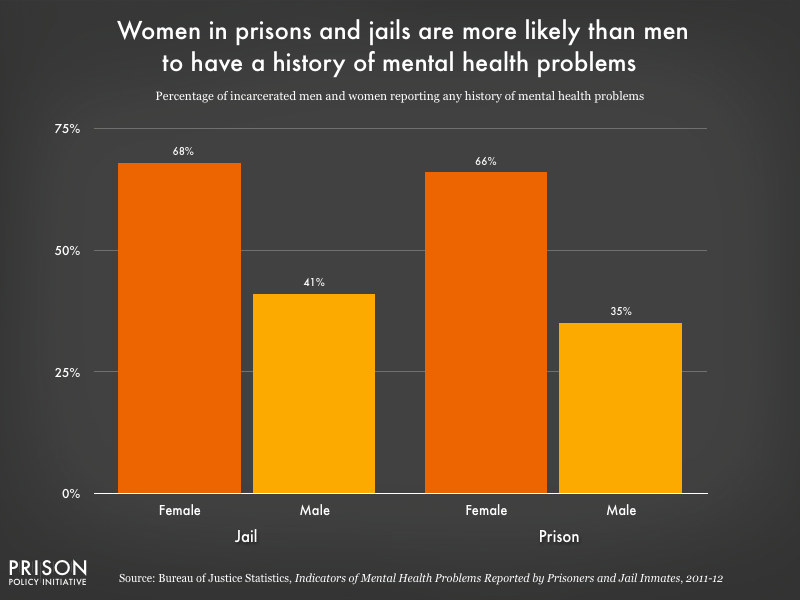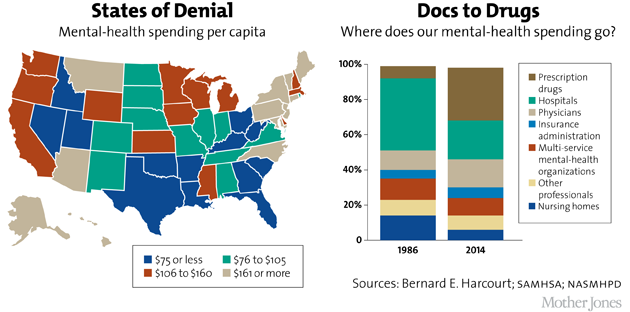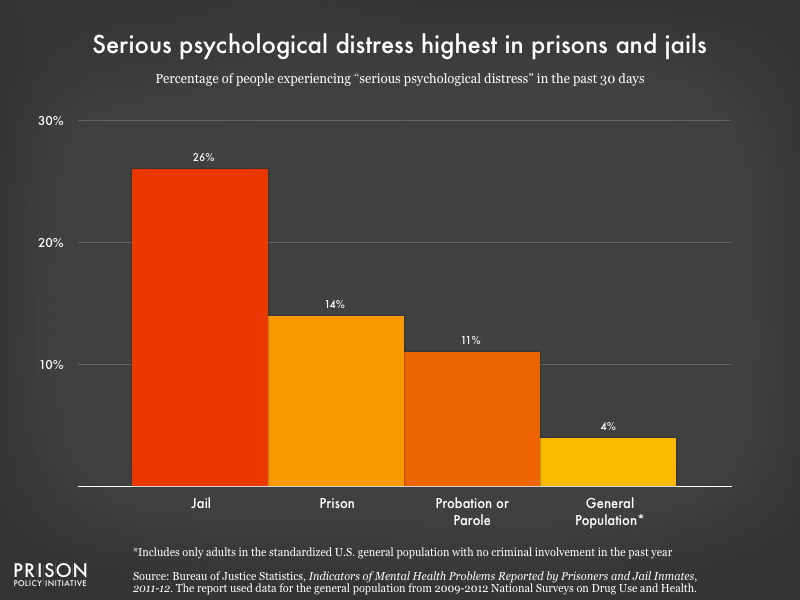- Get link
- X
- Other Apps
According to the Department of Justice nearly 13 million people with mental illness are incarcerated in state and federal jails and prisons compared to only about 70000 people being served. Additionally services in prison may not be all that effective.
 Recidivism Among Prison Inmates With Serious Mental Illness Watchblog Official Blog Of The U S Government Accountability Office
Recidivism Among Prison Inmates With Serious Mental Illness Watchblog Official Blog Of The U S Government Accountability Office
Those who do offer services of some kind may be limited in the types of treatments they provide.

Mental illness in prisons treatments. Throughout the years prisons and mental health asylums have changed greatly especially concerning unfair prison treatment the reform movement and todays important impact. Investing in mental health and substance use services for all people will reduce the likelihood that individuals will ever face incarceration in their lifetime. In Miami-Dade 197000 adults and 55000 children suffer from a serious mental illnessthats almost three times national average.
The Bureau of Prisons said that care levels could fluctuate for many reasons such as inmates mental health becoming more stable as they adjust to prison. Divert people with mental disorders towards the mental health system. The treatment therapies provided for mental illness in prisons will vary among all institutions.
Even when mental health concerns are known disorders often go untreated. We were spending 500000 a daythats 180 million a year to warehouse people in the county jail says the judge. Currently 35 of county inmates are on psychotropic meds.
Almost one-third of people with a mental illness get into the treatment systems through an encounter with a police officer studies show. This report is the first national survey of such treatment practices. Before the reform movement prisoners and the mentally ill were treated cruelly.
Currently the system simply warehouses the vast majority of people with mental illness and few people in the system receive effective treatment. It focuses on the problem of treating seriously mentally ill inmates who refuse treatment. Self-direction individualized and person-centered care empowerment holistic treatment non-linear progression strengths-based focus peer support respect responsibility and hope.
Individuals in prison and jails have a right to receive medical care and this right pertains to serious mental illness just as it pertains to tuberculosis diabetes or hypertension. A disproportionate amount of people in prison suffer from mental illness. Mental illness in prisons comes in many forms.
Inmates with schizophrenia were most likely to receive pharmacotherapy compared with those presenting with less overt conditions eg depression. Treatment such as Assertive Community Treatment and Multisystemic Therapy already have strong evidence for reducing days of incarceration. Most prisons lack the funds to offer adequate mental health treatment.
An agency spokesperson noted that inmates on the lowest care level have access to mental-health treatment services such as psychiatric medication. Psychology Treatment Programs PTPs mental health interventions and treatment plans for inmates with mental illness. Almost 40 of people in state and federal prisons are struggling with some type of diagnosed mental illness.
The current reform of prison health care involves a move away from the traditional model which focuses on the prison health care centre towards developing more comprehensive mental health promotion and primary care services together with day care and wing-based treatments for prisoners with mental health problems Department of Health 2001. Legislation can be introduced which allows for the transfer of prisoners to. In prison more than 50 of those who were medicated for mental health conditions at admission did not receive pharmacotherapy in prison.
Prisons are the wrong place for many people in need of mental health treatment since the criminal justice system emphasizes deterrence and punishment rather than treatment and care. Mental Illness in Prisons is Common and Needs to be Treated Types of Mental Illness in Prisons. The components of recovery are.
Prisoners have episodes of. This right to treatment has been affirmed by the US.
 New Government Report Points To Continuing Mental Health Crisis In Prisons And Jails Prison Policy Initiative
New Government Report Points To Continuing Mental Health Crisis In Prisons And Jails Prison Policy Initiative
 There Are 10 Times More Mentally Ill People Behind Bars Than In State Hospitals Mother Jones
There Are 10 Times More Mentally Ill People Behind Bars Than In State Hospitals Mother Jones
 New Government Report Points To Continuing Mental Health Crisis In Prisons And Jails Prison Policy Initiative
New Government Report Points To Continuing Mental Health Crisis In Prisons And Jails Prison Policy Initiative
Jails Prisons Hold 10 Times More Mental Health Patients Than State Hospitals Vox
/media/img/posts/2015/04/Screen_Shot_2015_04_03_at_11.10.01_PM/original.png) Most Prisoners Are Mentally Ill The Atlantic
Most Prisoners Are Mentally Ill The Atlantic
 Research Weekly Top Federal Research Agency Investigates Types Of Crimes Committed By Individuals With Serious Mental Illness In Us Prisons Treatment Advocacy Center
Research Weekly Top Federal Research Agency Investigates Types Of Crimes Committed By Individuals With Serious Mental Illness In Us Prisons Treatment Advocacy Center
 Most State Corrections Spending Supports Prison Operations Or Health Related Services Including Mental Health Care California Budget Policy Center
Most State Corrections Spending Supports Prison Operations Or Health Related Services Including Mental Health Care California Budget Policy Center

 Many Californians In Prisons And Jails Have Mental Health Needs California Budget Policy Center
Many Californians In Prisons And Jails Have Mental Health Needs California Budget Policy Center

 The Revolving Door Mental Illness Incarceration Inadequate Care And Inadequate Evidence Urban Institute
The Revolving Door Mental Illness Incarceration Inadequate Care And Inadequate Evidence Urban Institute
 Research Weekly Mental Health Symptoms Rule Rather Than Exception Behind Bars Treatment Advocacy Center
Research Weekly Mental Health Symptoms Rule Rather Than Exception Behind Bars Treatment Advocacy Center
 The New Asylums Jails Swell With Mentally Ill Wsj
The New Asylums Jails Swell With Mentally Ill Wsj
 Many Californians In Prisons And Jails Have Mental Health Needs California Budget Policy Center
Many Californians In Prisons And Jails Have Mental Health Needs California Budget Policy Center
Comments
Post a Comment